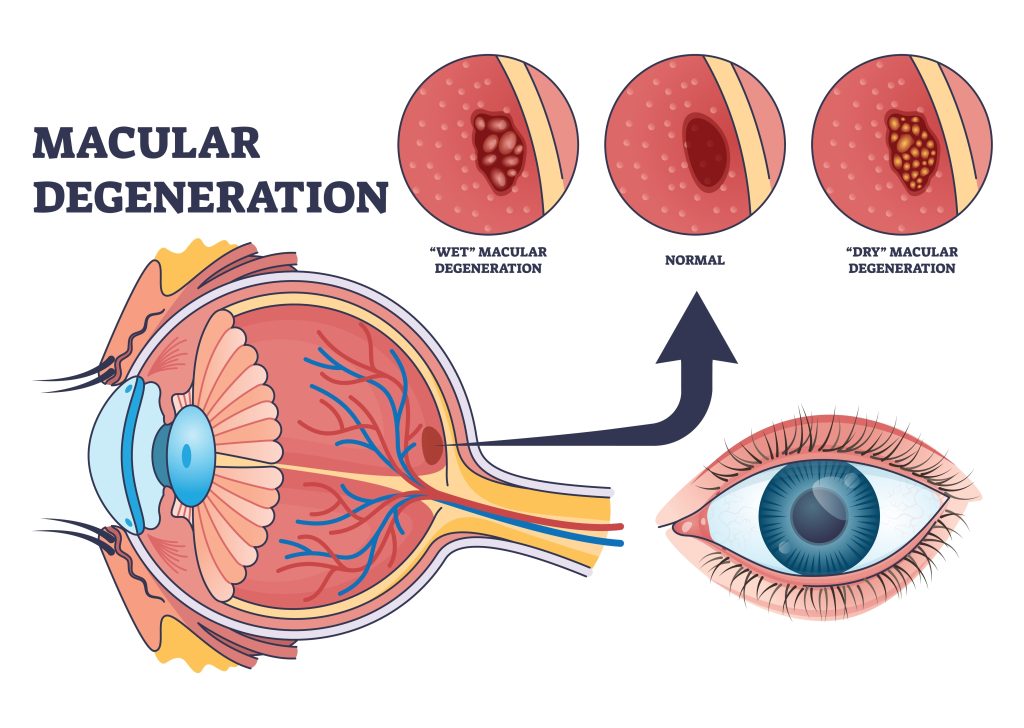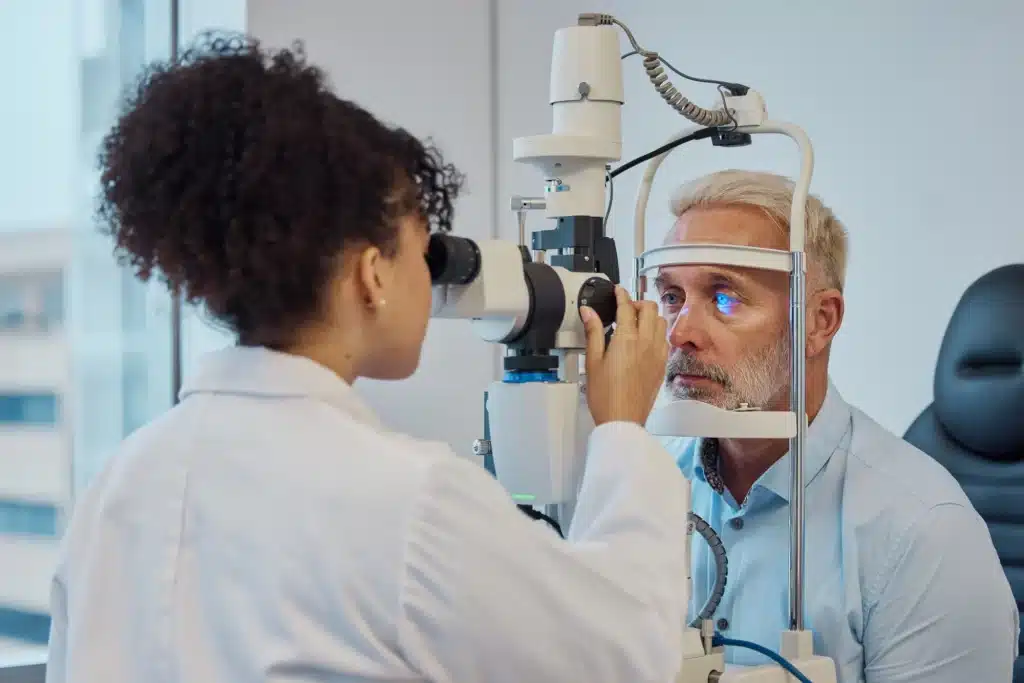Medically Reviewed by: Paul J. Stewart M.D.
Can Macular Degeneration Be Cured?
Age-related macular degeneration (AMD) is one of the most common causes of vision loss in older adults. However, not everyone who develops this condition will experience severe changes to their vision, especially at first.
When in more advanced stages, those with macular degeneration can have more trouble seeing objects directly in front of them and have significantly compromised night vision. There is no cure for AMD, but there are treatments that can slow the progression of the condition.
Keep reading to learn more about macular degeneration and the treatments available to slow or stop vision loss!
What is Macular Degeneration?
The macula is part of the retina that controls the central part of your field of vision. There are two types of macular degeneration: dry and wet.
Dry macular degeneration develops when the tissue of the macula grows thinner with age. In addition, macular degeneration can slow down the transport of nutrients and wastes by the retinal pigment epithelium (RPE). Waste products can accumulate under the retina and form yellowish deposits called drusen. Drusen can cause vision changes over time.
Dry AMD progresses over several years, going from early dry AMD to intermediate, then late AMD. There is no cure for the condition, but there are treatments that can slow progress and reduce the risk of vision change.
Wet AMD is less common and occurs when AMD is accompanied by abnormal blood vessel growth in the eye. It begins at a late stage and causes more rapid vision loss than dry AMD.
Dry AMD can become wet AMD at any stage if your eyes start to develop abnormal blood vessels alongside other changes to the macula.
What Are the Symptoms of Macular Degeneration?
Macular degeneration symptoms vary depending on your degree of AMD progression. Early dry AMD typically doesn’t cause any symptoms.
Intermediate dry AMD may not cause noticeable symptoms, but you may notice mild blurriness in your central vision or difficulty seeing in low lighting. Late dry AMD and wet AMD, on the other hand, can cause noticeable vision changes.
At this point, you may notice that straight lines look wavy or crooked. You may also experience a blurry area in the center of your vision.
This blurry area may get larger, or you may develop blank spots in your vision. Colors may also seem duller, and you may have difficulty seeing them in low light.
Another complication of dry AMD is geographic atrophy, or the loss of cells in the retina, which contributes to the loss of central vision.
How Can You Slow AMD Progression?
Macular degeneration treatment can slow progression. The type of treatment your eye doctor recommends for macular degeneration management will depend on the type and stage.
Most people with early or intermediate dry AMD will not require treatment. Your eye doctor may have you come in regularly to monitor your eyes.
You may be able to slow the progress of dry AMD by taking nutritional supplements. AREDS and AREDS 2 supplements are specific formulations of vitamins and minerals that are clinically shown to slow the progression of early or intermediate dry AMD and reduce the risk of vision loss.
The supplements are available over the counter. Talk to your eye doctor about whether AREDS or AREDS 2 supplements are right for you.
In addition to taking supplements to slow AMD progress, you may benefit from lifestyle changes that help accommodate low vision. Keep your prescription for glasses or contacts up to date so you have the right correction for any refractive errors.
Add brighter lighting to your home or office to offset difficulties seeing in low light. Magnifying lenses may help make reading easier.
Increasing brightness and font size on phones and tables can also be helpful.
What Are the Latest Treatment Options for Macular Degeneration?
These are the latest treatment options available for both wet and dry AMD:
Dry AMD Treatments
If AMD has caused geographic atrophy, there are medications that can slow down additional retinal cell loss and delay vision changes. Two drugs called Syfovre and IZERVAY are approved by the FDA for AMD with geographic atrophy.
Both of these treatments are administered as intraocular injections. You would come into your eye doctor’s office for treatment, and they will administer numbing eye drops to prevent discomfort.
With both of these injections, patients will require regular treatments.
Wet AMD Treatments
If you have wet AND, you may benefit from anti-VEGF drugs or laser surgery. VEGF stands for vascular endothelial growth factor, a chemical in the body that can contribute to the abnormal blood vessel proliferation characteristic of wet AMD.
Anti-VEGF treatments block that chemical. This helps reduce the number of abnormal blood vessels in your retina and reduces leaking from blood vessels.
Anti-VEGF treatments are administered as injections. You will need to come in for treatment every month or so.
Laser surgery is another option for some cases of wet AMD. Your eye doctor can use lasers to destroy abnormal blood vessels, which reduces fluid leakage in the eye and slows the progression of wet AMD.
Which Lifestyle Changes Help Macular Degeneration?
Nutrition can have a positive effect on overall eye health. Research has shown that eating a diet high in spinach or collard greens can reduce the risk of developing macular degeneration.
Green leafy vegetables are good sources of lutein and zeaxanthin, which contribute to macular health. Omega-3 fatty acids and zinc are also shown to help macular health.
You can also protect your eye health by using adequate protection from UV rays. Sun exposure can increase the risk of age-related eye conditions.
Wearing UV-blocking sunglasses and shielding your face from the sun are the best ways to reduce the risk of UV damage. Regular eye exams are the best way to diagnose AMD early before you experience vision changes.
Your eye doctor can identify signs of AMD and give you advice on the best way to prevent vision changes from AMD in the future. At Eye Center of Texas, our experienced eye surgeons offer comprehensive eye exams and use the latest technology to detect macular degeneration.
Make your eyesight a health priority today and request an appointment with our ophthalmologists at Eye Center of Texas at one of our convenient locations throughout Texas.
Related Articles
Financing Options Available
Apply today to find a financing option that meets your needs.
Our Locations
Houston/Bellaire
6565 W. Loop S., Suite 650Bellaire, TX 77401
Medical Office:
713-797-1010
Medical Fax:
713-357-7276
LASIK/Near Vision:
Office: 713-395-1515
Fax: 713-357-7278
Pasadena
4415 Crenshaw RoadPasadena, TX 77504
Medical Office:
281-977-8800
Medical Fax:
281-977-8877
Sugar Land
15200 S.W. Freeway, Suite 130Sugar Land, TX 77478
Medical Office:
281-277-1010
Medical Fax:
281-277-4504
Clear Lake
455 E. Medical Center Blvd., Suite 110Webster, TX 77598
Medical Office:
281-332-1397
Medical Fax:
281-282-9152
Katy
Greenhouse Medical Plaza2051 Greenhouse Road, Suite 110
Houston, TX 77084
Medical Office:
346-547-7070
Medical Fax:
281-214-2971
The Woodlands/Conroe
100 Medical Center Blvd., Suite 118Conroe, TX 77304
Medical Office:
936-647-1610
Medical Fax:
936-647-1620





